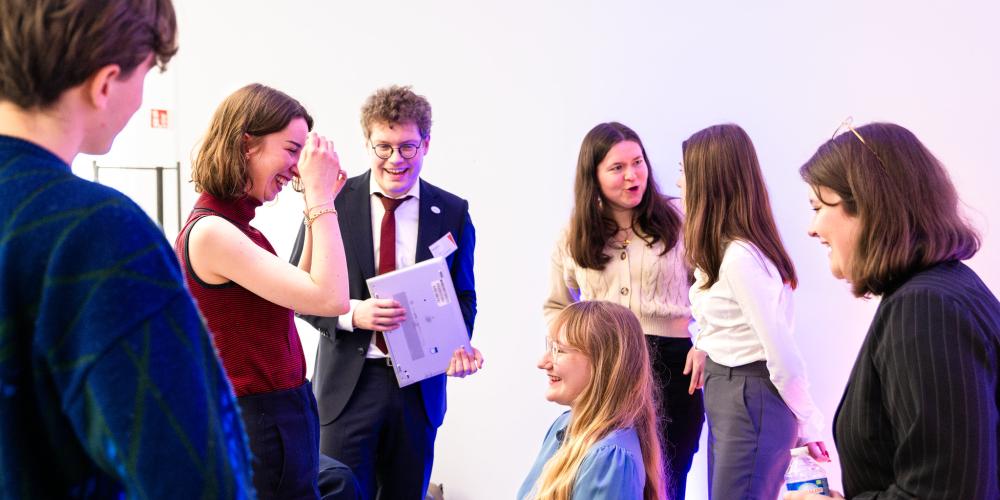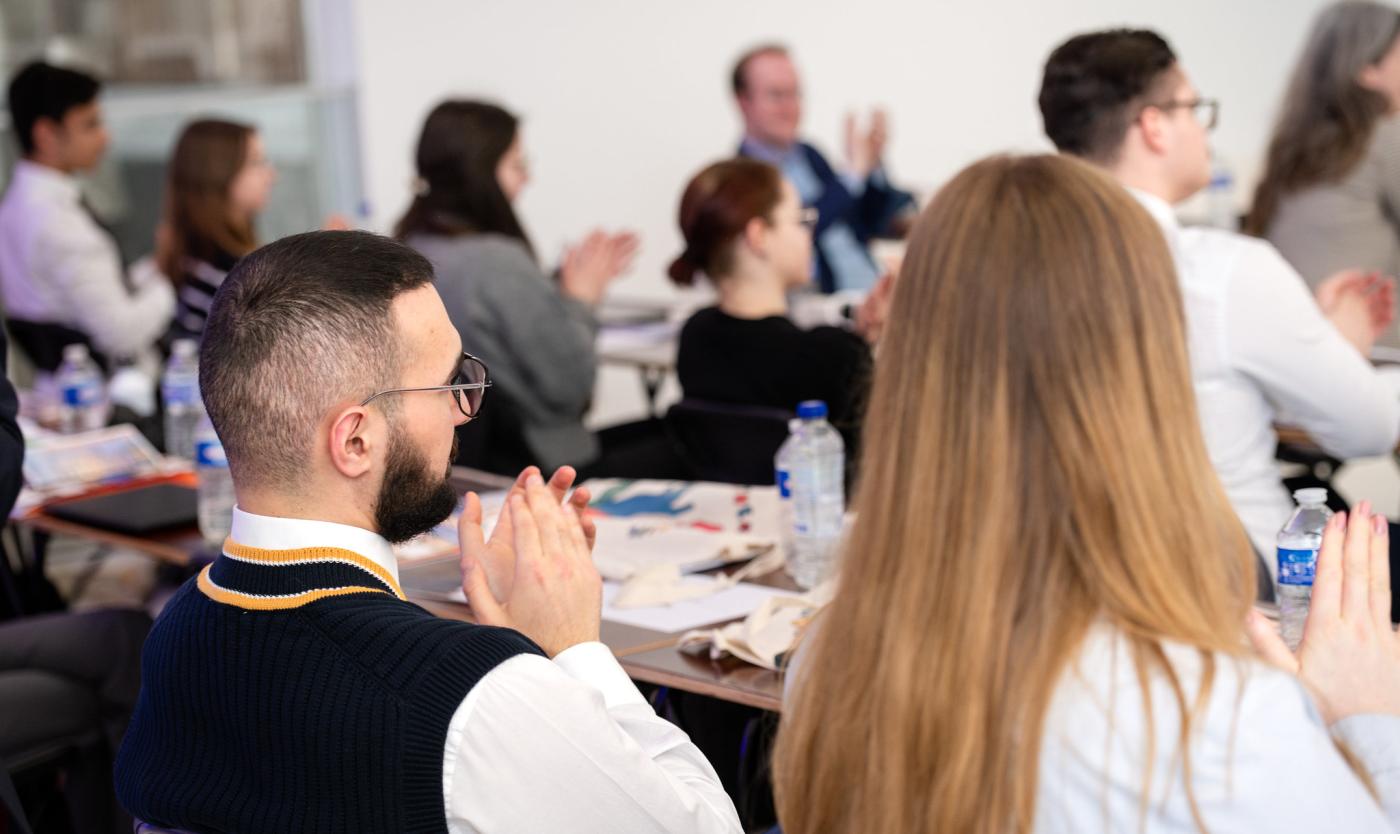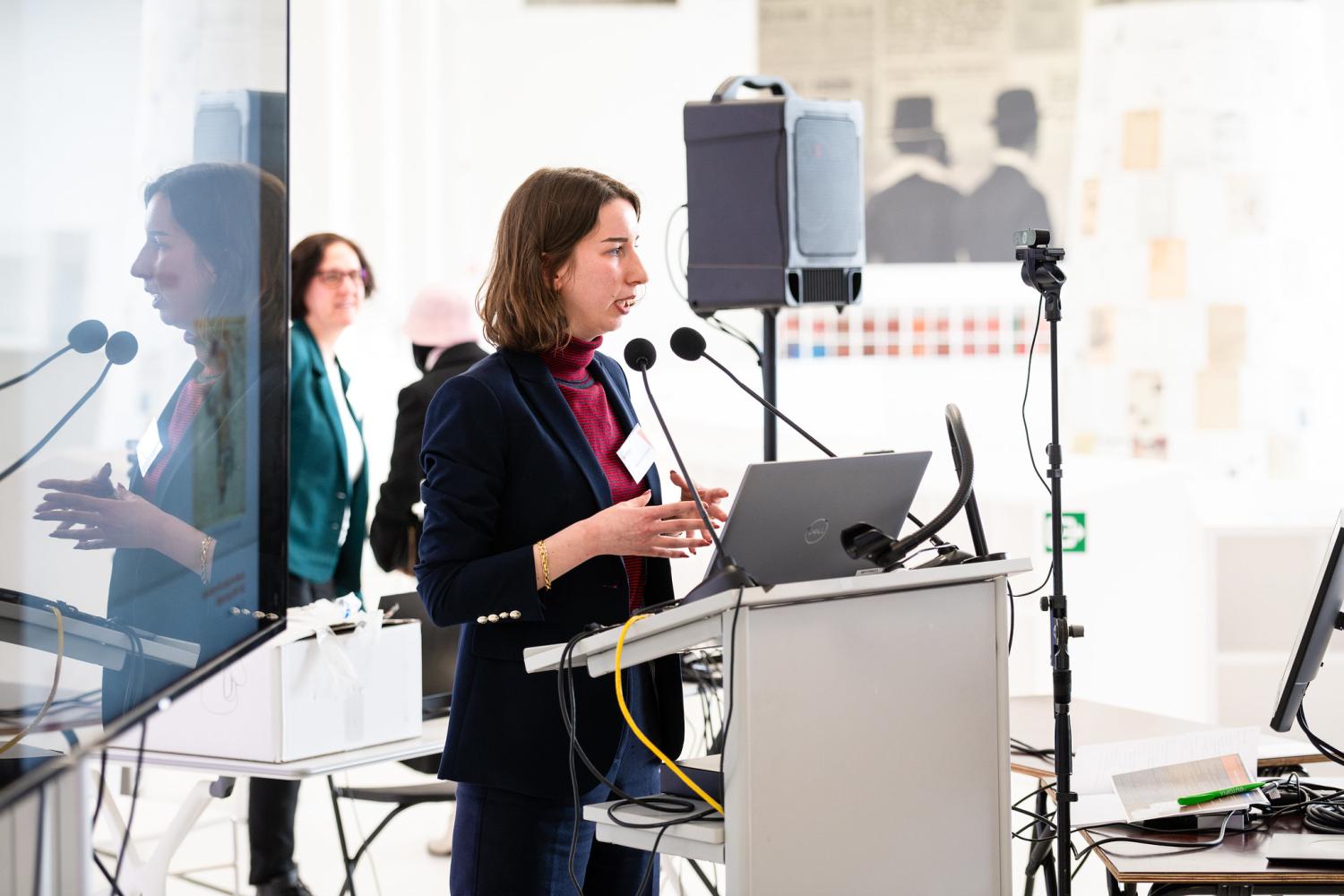
VUB professor Frederik Dhondt is leading an enthusiastic group of international students and academics comparing their countries’ legal history. This Connected Learning Community is part of the EUTOPIA European university network. “Later, these students will hold positions in which they make the rules,” he says.
Does international cooperation make legal history more interesting?
“In EUTOPIA, we emphasise diversity and multilingualism. An important aspect is that students can present their papers in their own language. For example, for students from Ljubljana, the capital of Slovenia, language is essential to their identity. There are only 2 million Slovenians and it’s a matter of honour for them to have a university in their own language. As a Dutch-speaking Flemish university in Brussels, we can well understand that.
“Each city has its own past and context that determines its view of legal history”
“If you want to teach legal history in today’s multi-layered and interconnected world, you need to take an international approach. In EUTOPIA, students compare national cases and discover the differences between countries . This year, for example, two students compared activism for women’s rights in France and Belgium. Each country had its own trajectory, but there were also similarities. An emancipatory movement emerged through protests and congresses, and action was taken through the courts to address the conservative patriarchal mentality within the legal community of the time.
“Later, these students will hold positions in which they make the rules. So the realisation that they have such legal tools at their disposal in socially important topics is very relevant.”

The students had a ‘Peak Event’ in Brussels. What did that involve?
“For EUTOPIA, the in-person experience is also important. We introduce students to the campuses and cities where legal history is being made. In Brussels, we visited the Palace of Justice, the Constitutional Court, the Royal Palace, the Palace of the Nation and the European Parliament. For the students at Warwick, who are experiencing the constraints of Brexit first-hand, they are seeing history up close.
“Each city has its own past and context that defines its view of legal history. To take just three of the other nine member universities: CY Cergy Paris Université’s campus is in the northwest of Paris, on the border between the countryside and the banlieue. Ljubljana has again become a very international city since Slovenia joined the EU. And Lisbon has a significant colonial past.”
How are the Connected Learning Communities organised?
“They are small communities focusing on one topic each, with five to eight students per EUTOPIA university and a number of academics who guide them with their scientific expertise. For us, these are Professor Caroula Argyriadis-Kervégan of CY Cergy Paris Université, Professor Katja Škrubej of the University of Ljubljana, Dr Rosie Doyle of Warwick and Professor Cristina Nogueira da Silva of NOVA University Lisbon. In turn, guest lectures and joint ideas emerge from this, such as the registration of joint PhDs
“In EUTOPIA, students compare national cases and discover the differences between countries"
“They provide interesting cases and new perspectives. For example, Prof Nogueira da Silva studied the status of indigenous peoples in the Portuguese colonial empire in the 19th and 20th centuries. Thanks to her expertise, VUB student Manon Hofströssler was able to compare this with debates between Belgian jurists and the courts on local populations in the Congo Free State and the Belgian Congo.”
What is the scientific importance of this?
“A lot of sources about the past come from courts, administrations, political organisations, diplomats... That is legal material prepared from completely different perspectives. To understand judicial decisions, laws or tracts from legal doctrine, you need specialised knowledge. Law has been taught in universities in Europe since the 12th century. Even if it is not literally the rules of Roman law that determined daily life everywhere in Europe, the way of thinking determined how society was governed.
“Often, law in itself is not decisive in conflicts, but rather the language in which political, economic or other power relations and demands are formulated. Take the extreme example of the Ukrainian-Russian conflict. The Russians present that as a civil war that escalated into an international conflict. The Ukrainians, of course, think completely differently. Each time, the legal wording is meant to convince a specialised audience on the other side of the line.
“You only come to such insights if you look beyond the boundaries of your own niche. Intellectually, that’s what I find most interesting about EUTOPIA’s Connected Learning Communities. In today’s scientific research, you have to excel in a micro-specialisation. The Connected Learning Communities do exactly the opposite by requiring you to look for common themes from different countries, and look for experts and resources within the partners’ networks. It expands your horizons enormously.”
Manon Hofströssler
“The community took me out of my comfort zone"
Manon Hofströssler is a final-year master’s student at VUB majoring in public law. She participated in the EUTOPIA Connected Learning Community on legal history, led by Professor Frederik Dhondt, in which she researched the legal status of the indigenous population of Congo Free State and colonial Congo.

Manon Hofströssler
Why did you want to participate in the Connected Learning Community on legal history?
“I’m writing my master’s thesis on the protection of the environment based on fundamental rights. Like many people of my generation, I’m keenly aware of the climate and its major impact on our well-being. Law does not allow you to check all the effects in a lab, but I am trying to contribute to social progress in my own way. That’s why I chose the legal history community. Historical insights help me use law to improve society. I have also been bitten by the academic research bug and want to pursue that later.
“Students have a lot of freedom in a EUTOPIA community, albeit under the guidance of professors like Frederik Dhondt. It’s up to us to choose a topic. At the EUTOPIA Peak Event, there was a lot of interaction between students and professors, who all contribute knowledge from their countries and expertise. So you learn a lot about each other’s legal systems and specific topics that you would otherwise not easily come into contact with. You also learn that there are quite a lot of similar
“Such a community offers students a taste of the real scientific world"
What subject did you look at?
“The title of my work was ‘Legal Status in the Congo Free State and Belgian Congo (1885-1960)’. I mainly researched the conditions for the indigenous people to obtain the status of immatriculé. This meant that they were no longer subject to local customary law but to written civil law.
“The interesting thing was that the requirements stemmed from a strong sense of superiority on the part of the Belgians that was inherent to colonial thinking. It was part of the European civilising mission, the standard of civilisation. The main criterion was whether the person could be considered ‘civilised’. Which in practice, of course, meant that they had to adopt European customs.”
What has the EUTOPIA Connected Learning Community offered you?
“The community took me out of my comfort zone and allowed me to discover new areas. Of course with the help of professors, like Professor Cristina Nogueira Da Silva of NOVA University Lisbon, who passed on a lot of knowledge about her research on a comparable status in the Portuguese colonies in Africa. This gave me new ideas that gave a new perspective to the sources I found at, for example the Royal Library. There are great treasures of resources there, really incredible.
“Such a community offers students a taste of the real scientific world. Of course, you already have more opportunities to participate in research in the final years of your studies. But it’s not the same as in the framework of a EUTOPIA community, where you get to present your research to an international group of experts and it is also published online. It really is a very nice training opportunity to get acquainted with academic research in a low-threshold but solid way.”